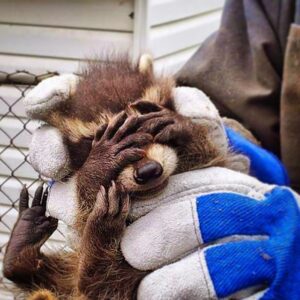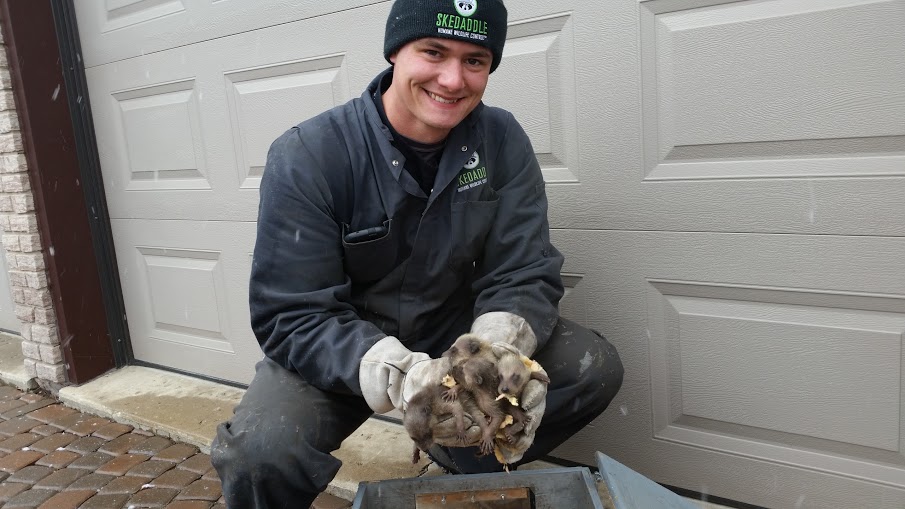If a raccoon is trapped in your attic, you may be tempted to handle the situation on your own. Should you try to get rid of the raccoon yourself? Or should you call for professional raccoon control in Bowmanville? Take a deep breath and read what may happen if you attempt to handle a raccoon on your own.
Raccoons Can Bite
A raccoon bite is not a minor injury. Raccoons are not aggressive animals, but when cornered or threatened, they can and will attack, and can cause severe lacerations to the skin. This is because a raccoon’s teeth are adapted to its omnivorous diet. The molar teeth in the back of a raccoon’s mouth are rounded like ours for grinding plant food, but those in front are adapted for eating meat. Four sharp canine teeth designed to kill prey can make deep puncture wounds in human skin, and the scissor-like carnassial teeth along the cheeks can shear off pieces of flesh. You don’t want these teeth touching your body.
You may think it will be safe if you wear gloves, but the problem is that even the thickest work gloves are not sufficient to protect you. Trained animal handlers know this and invest in special puncture-resistant gear much stronger than what is commonly available to the public. But even professional quality gloves will not protect other sensitive areas of your body such as your chest, face, and eyes, which can all be targets of a panicked raccoon’s sharp claws as it flails around and tries to break free of your grasp.
Raccoons Carry Rabies
Another factor to consider when deciding whether to wrangle a raccoon is the potential for catching a disease. In Ontario, compared to other wildlife, raccoons are the animals most likely to carry rabies, a fatal virus that destroys the nerves and brain. It can be spread through saliva from an infected animal, so you are at risk of catching rabies if a raccoon bites or even scratches you. The period between being exposed to a rabid animal and showing symptoms can last up to 12 weeks, but once symptoms appear, the disease has already become quite advanced internally.
Before symptoms arise, there is no way for doctors to determine whether a person has the virus in his or her body. For that reason, anyone bitten by a wild animal is treated for rabies, just in case. The preventative treatment for rabies consists of several injections. The first, rabies immune globulin, is injected directly into the bites and is reported to be extremely painful. The next shot is a rabies vaccine, and finally, a tetanus vaccine is given. The patient must then return to the hospital for additional rabies vaccines on days three, seven, and 14 after the initial bite.
A final thought before grabbing that raccoon is the fate of the animal itself. Just because you want it out of your attic doesn’t mean you wish it any harm. However, if a hospital treats you for a raccoon bite or scratch, the situation often does not end well for the animal. Any wild animal that bites a person is considered a threat to public health, and it may be kept for observation during the viral incubation period. If the raccoon happens to be a mother, then this time away from her den might endanger any babies she has. Baby raccoons are totally dependent on their mothers for eight weeks after birth, and depriving them of her care would leave them alone and helpless.
Once you have thought through all the ramifications of handling a raccoon on your own, the choice is obvious. Don’t try to be a hero. If there is a raccoon in your house, contact Skedaddle Humane Wildlife Removal for help.




